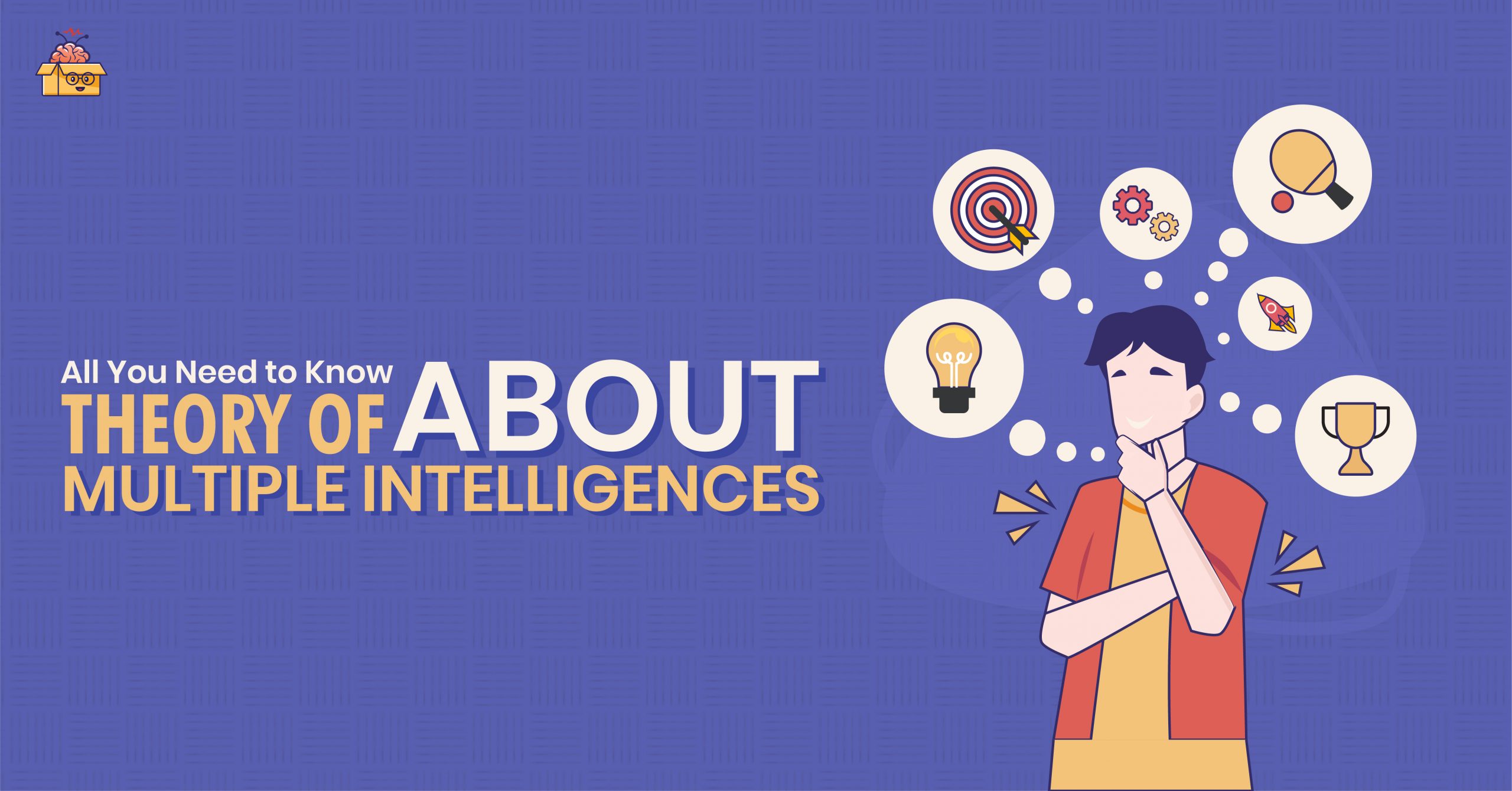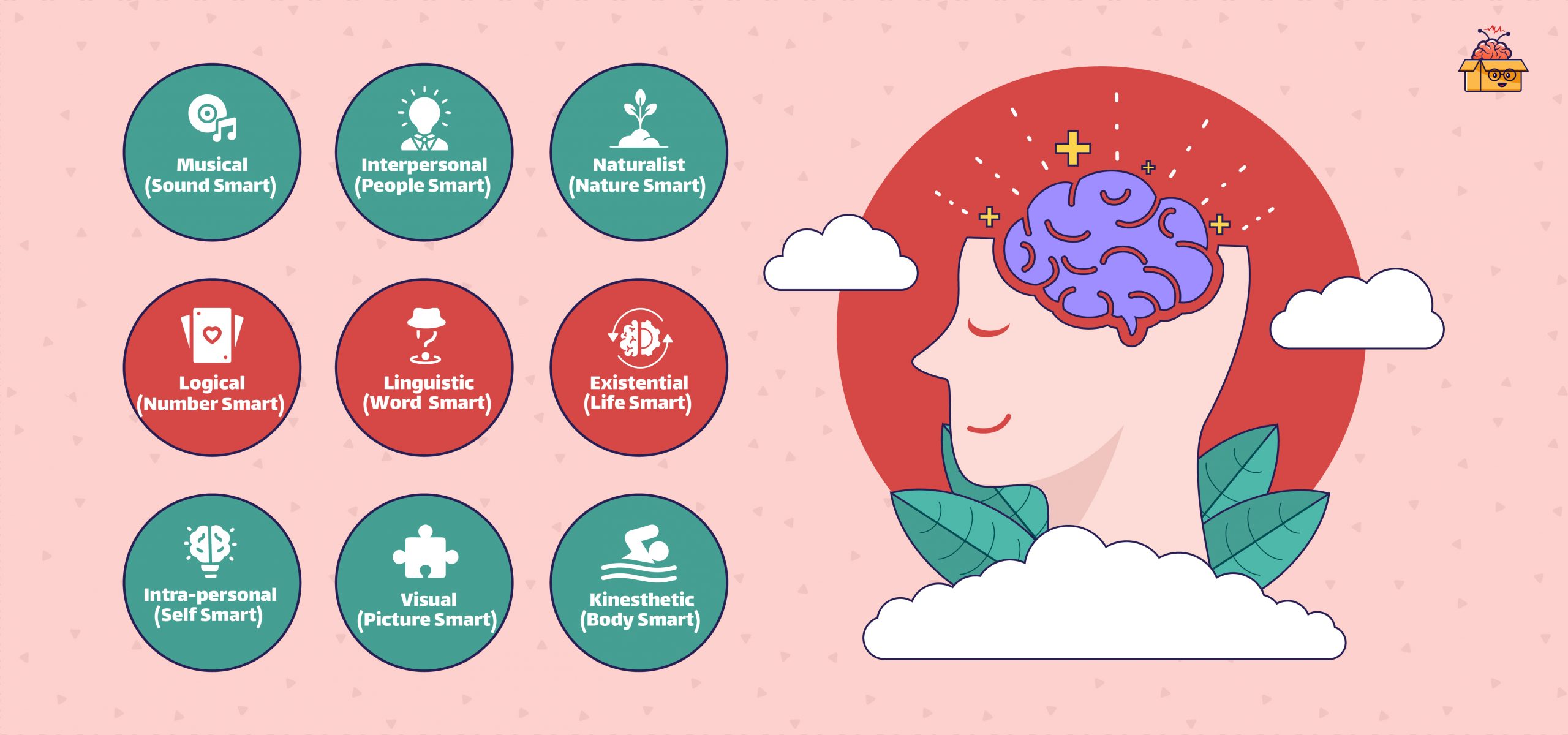-
What’s Gardner’s Theory of Multiple Intelligences: Everything You Need To Know

“Intelligent” — just take a few moments to soak this word in, and tell me what comes to your mind.
A nerdy scientist wearing big black nerd glass? A mathematician relentlessly solving theorems on a blackboard? Albert Einstein?
Well, if you connotate intelligence with such images, it’s because we are beaten down to believing that intelligence is a single cognitive ability that’s related to logic, mathematics, or sometimes language.
But Howard Gardner, a development psychologist, challenged this notion with the theory of multiple intelligences.
He introduced eight different types of intelligences and broadened the old notion associating it with a single criterion. He proposed eight different kinds of intelligences:
- Linguistic (word smart)
- Visual-Spatial (picture smart)
- Logical-mathematical (number/reasoning smart)
- Bodily-kinesthetic (body smart)
- Musical (sound smart)
- Interpersonal Intelligence (people smart)
- Intrapersonal Intelligence (self smart)
- Naturalist Intelligence (nature smart)
What other scientists and psychologists considered mere talents or soft skills, Gardner presented them as intelligences. And it makes some real sense: If the ability to solve a complex math problem is intelligence then why not understanding people, music, or nature? Even that’s intelligence but just of a different kind.
This article walks you through this widely discussed and hailed theory. We’ll understand what is multiple intelligence, some criticism and myths about the theory, and each multiple intelligence in detail.
Sounds like a plan? Let’s dive in.
What’s the Theory of Multiple Intelligences?
Howard Gardner first introduced the theory of multiple intelligences in his book: Frames of Mind. He suggests that the traditional notion of intelligence is quite narrow because it considers a single criterion of human intelligence. For example, IQ tests that are popular as a measure of human intelligence mainly consider a person’s linguistic and logical-mathematical abilities. But intelligence is not just limited to it.
So Gardner proposed eight different kinds of intelligence known as multiple intelligence to demonstrate the full range of human intelligence.

(Gardner’s Theory of Multiple Intelligences)
One of the reasons Gardner’s intelligence covers a broad range is because it recognizes the creation of artifacts, music, or sculptures as an expression of intelligence. Whereas traditional theories do not consider these creations as expressions of intelligence.
“An intelligence is the ability to solve problems, or to create products, that are valued within one or more cultural settings.”
Criticism
Apart from popularity, Gardner’s theory has also faced some criticism. Many psychologists and educators argue that the different multiple intelligence stated in the theory does not represent intelligence but talent and personality traits. It’s also criticized on the basis of a lack of practical and empirical support.
Multiple Intelligences are Not Learning Styles
Regardless of the criticism, the theory is widely popular and discussed in the field of education to improve school-based practices. This also leads to often misinterpreting it as learning styles.
The primary reason to develop the theory was not to improve teaching practice but to state and recognize the different human intelligences. While multiple intelligence refers to different intellectual abilities of a person, the learning style is a way or behavior in which an individual learns.
As per Howard, learning styles — visual, auditory, kinesthetic, reading/writing, etc. — are the ways in which people approach the tasks. He describes the idea of learning style as: “a hypothesis of how an individual approaches a range of materials.”
List of Multiple Intelligences
1. Linguistic Intelligence – Word/Book Smart
Linguistic intelligence or word smart is the ability to understand words both written and spoken and effectively use them. This intelligence involves understanding language and words including idioms and wordplay and its socio-cultural nuances.
People with linguistic intelligence tend to have great skills for reading, writing and speaking, They enjoy literature, creative writing, telling stories, and even word brain games like crosswords.
Characteristics
- Ability to think in words
- Expressive complex meaning
- Enjoy reading, writing
- Remember written and spoken words
- Good at debates and speeches
Potential Profession
- Writer
- Journalist
- Lawer
- Teacher
2. Visual-Spatial Intelligence – Art/Picture Smart
Visual-spatial intelligence is the ability for visual and spatial judgment. It’s the ability to think in three dimensions, picture concepts in mind, spatial reasoning, graphic and artistic skills.
Professionals such as sculptors, artists, designers, architects exhibit great visual intelligence while pilots, sailors, navigators exhibit the ability to understand and navigate wide space — spatial intelligence. People with this kind of intelligence like to draw, paint, design, work with clay, and create patterns. They have an inclination and knack for solving visual puzzles, jigsaw puzzles, mazes, and drawing.
Characteristics
- Good at visualizing things
- Can think in images, pictures
- Good with navigating, solving jigsaws puzzles, drawing
Potential Profession
- Artist
- Designers
- Navigators
- Architect
3. Logical-Mathematical Intelligence – Number/Reasoning Smart
Logical-mathematical intelligence gives the ability to analyze and solve problems, perform calculations, recognize patterns — thoughts, numbers, visuals, etc., and carry out things with logic. People with this intelligence tend to think abstractly in patterns and concepts. They tend to apply logic, math, and numbers in different things. They are drawn towards working with numbers, solving math puzzles and love to solve complex problems.
Characteristics
- Exceptional problem-solving skills
- Good with calculations and abstract problems
- Good with analyzing situations
Potential Profession
- Mathematician
- Programmer
- Engineer
- Scientist
- Statistician
- Accountant
4. Bodily-Kinesthetic Intelligence – Body/Moment Smart
Bodily-kinesthetic intelligence is the ability of excellent motor control and physical dexterity. It provides body awareness and the mind-body union. This makes people effectively perform tasks that require skilled body actions , physical skills, and perfect timing. Athletes, dancers, actors, crafts professionals, surgeons, etc. exhibit great kinesthetic intelligence.
Characteristics
- Exceptional mind-body coordination
- Great muscle memory
- Skilled in sports and dancing
Potential Profession
- Athlete
- Dancer
- Sculpture
- Actor
- Builder
5. Musical Intelligence – Sound/Music Smart
Musical intelligence is the ability to understand, create, and reproduce sounds — pitch, rhythm, tone, timbre, etc. In the initial research of multiple intelligences, musical intelligence mostly revolved around music and rhythm. But later it was accepted as auditory-vibratory intelligence as it deals with a wide area of sound and vibrational patterns.
People with musical intelligence have an ear for music, sounds in the environment, and rhythmic patterns. This intelligence is exhibited by composers, musicians, vocalistic, etc.
Characteristics
- Discern sounds and musical pattern
- Understanding of rhythm and notes
- Can recognize and remember sound patterns and tones
Potential Profession
- Musician
- Composer
- Singer
- Conductor
6. Interpersonal Intelligence – People Smart
Interpersonal intelligence refers to intelligence and behavior when among people. It’s the intelligence to understand others and interact effectively. Hence people with interpersonal intelligence are called people smart. They have the ability to analyze the emotions, motivations, moods, and desires of people around them that helps them to manage relationships.
People with interpersonal intelligence can be easily spotted in crowds by their skills to communicate, handle social situations, and sensibility towards others.
Characteristics
- Skilled verbal and nonverbal communication
- Great at maintaining relationships
- Active listeners
- Empathetic
- Can persuade and resolve conflicts
Potential Profession
- Politician
- Teacher
- Counselor
- Salesperson
7. Intrapersonal Intelligence – Self/Introspection Smart
Intrapersonal intelligence is the ability to understand oneself, one’s own thoughts and feelings. It involves self-awareness — awareness of our inner world and belief — and using it to direct life.
Characteristics
- Excellent self-awareness
- Likes to analyze one’s thoughts and ideas
- Understands one’s motivations and feelings
- Great in analyzing one’s strengths and weaknesses
Potential Profession
- Philosopher
- Writer
- Artist
- Theorist
8. Naturalistic Intelligence
Naturalistic intelligence gives humans the sensibility to flora, fauna, and other elements of nature. It is the latest addition to multiple intelligences theory. As per Gardner, people with this intelligence are highly aware of and interested in nature, learning about different species of plants and animals and the environment.
Such people enjoy camping, hiking, gardening, and similar outdoor activities. In the past humans possessed high naturalistic intelligence as hunters, farmers, and gatherers. And even today professionals such as biologists, botanists, zoologists, farmers, and gardeners display this intelligence.
Characteristics
- Interested in botany and zoology
- Enjoy exploring nature and the outdoors
- Feels a connection with nature
Potential Profession
- Biologist
- Conservationist
- Gardener
- Farmer
Additional Multiple Intelligences
Apart from these eight intelligences, Gardner has alluded the possibility of more intelligences in his several works — such as existential intelligence, teaching-pedagogical intelligence, cooking intelligence, and humor. But these still lack to fulfill the criteria of intelligence.
Wrapping Up
Alfred Binet, the inventor of the IQ test, believed intelligence is comprehensive, and single quantitative measures such as IQ scores can not fully capture it. Gardner’s theory of multiple intelligence proves it. It is indeed a breakthrough in understanding human cognition that’s re-evaluating our understanding and concept of the complex human mind.
Before You Go —
If you’re looking for a better way to spend time on your phone and pump those brain muscles, Smart Brain is what you need. Download Now For FREE
 19119
19119







